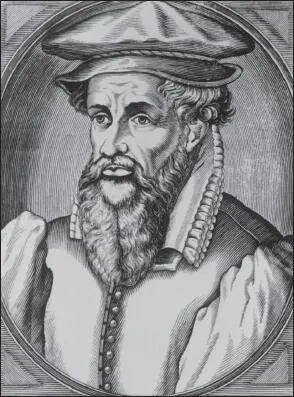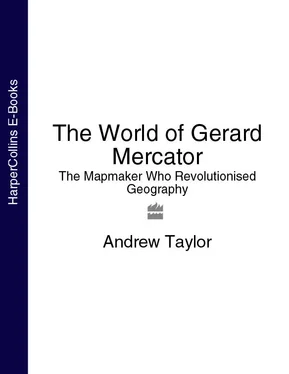FOR SAM, ABI, AND BEC,
and all the years they have to come.
Cover
Title Page
Dedication
Introduction
CHAPTER ONE: Pushing Back Shadows
CHAPTER TWO: Forgotten Wisdom
CHAPTER THREE: A Small Town on the River Scheldt
CHAPTER FOUR: Among the Brethren of the Common Life
CHAPTER FIVE: At the College of the Castle
CHAPTER SIX: Doubts and Dangers
CHAPTER SEVEN: Gemma’s Globe
CHAPTER EIGHT: Craftsman and Cartographer
CHAPTER NINE: The Greatest Globe in the World
CHAPTER TEN: In the Hands of the Inquisition
CHAPTER ELEVEN: Two New Arrivals
CHAPTER TWELVE: A New Life
CHAPTER THIRTEEN: Our Europe
CHAPTER FOURTEEN: A Mysterious Commission
CHAPTER FIFTEEN: In the Forests of Lorraine
CHAPTER SIXTEEN: Tragedy
CHAPTER SEVENTEEN: The Sum of Human Knowledge
CHAPTER EIGHTEEN: The World Hung on the Wall: The Projection
CHAPTER NINETEEN: Presenting Ptolemy to the World
CHAPTER TWENTY: A “Thick Myste of Ignorance” Dispelled
CHAPTER TWENTY-ONE: The Geography of the World
CHAPTER TWENTY-TWO: The Gathering Dark
Afterword
Keep Reading
Notes
Bibliography
Index
Acknowledgments
About the Author
Praise
Also by the Author
Copyright
About the Publisher
ONE OF MY earliest memories is of myself as a small boy sitting on a wide window ledge, with my whole world laid out around me. As I turned my head, I took in the comfortable, familiar room behind me, the door into the kitchen, and the wooden sideboard up against the wall, while outside I could see down the yard toward the joiner’s shop, which I knew was filled with sawdust and sharp blades. I could also see the familiar stone steps up to my front door, and another house across the way, where an old man used to sit in the doorway for hours on end, dozing.
That was about as far as my world stretched. I was aware, of course, of other worlds beyond, worlds I had heard about, half understood, or imagined for myself. Scattered among them were a few familiar islands that I had visited and knew fairly well – the stone-flagged floor of the greengrocer’s on the corner, for instance, the high wall on top of which I could walk up to the church, or the little vegetable garden where I used to watch my father as he worked – but for all intents and purposes, they were surrounded by darkness. Good things occasionally came in from those shadows outside – bars of chocolate brought by a kindly aunt, perhaps, or my mother’s shopping – but they were on the whole mysterious and unwelcoming, and if I occasionally peopled them with monsters, that was no more than any child does.
The story of discovery and mapmaking is one of pushing back shadows. The great explorers brought back undreamed-of riches and stories of unknown lands and peoples that were barely believable – the discovery of America, for instance, has been described as the greatest surprise in history – but their claims and discoveries had to be evaluated, laid out on paper, before they could form a coherent picture of the world. Much of that work was carried out by unknown figures, whose maps are lost, forgotten, or remembered only by passing mentions in ancient documents. Some were sailors or traders themselves, trying to prepare reliable charts for their own use and for those who came after them, but many were scholars who never went to sea. A few became famous and produced individual maps that stand out as landmarks in the history of the understanding of the planet. But none, in the last two thousand years, achieved as much as Gerard Mercator in extending the boundaries of what could be comprehended.
Mercator saw himself as a scholar in the ancient tradition, an uomo universale in the mold of the Renaissance – a seeker of truth to whom the whole of knowledge was a single book to be opened. His achievement was nothing less than to revolutionize the study of geography and redraw the map of the world.
Born near Antwerp in 1512, he lived through almost the entire turbulent sixteenth century – an age in which the known world grew year by year as new voyages made new discoveries, but one which also saw the Catholic Church and Europe itself torn apart by Martin Luther and the Protestant reformers. The sacking of cities, the smashing of statues by reformist zealots, and the religious savagery of Church authorities were all part of the temper of the times. This was the age of the Inquisition, whose power, as Mercator was to discover firsthand, extended across the Low Countries: The judicial torture and burning of the unfaithful were commonplace. But it was also an age of intellectual upheaval. Almost halfway through the century, the Polish astronomer Nicolaus Copernicus published his revolutionary theory that the Earth revolved around the Sun – an idea that was confirmed some sixty-five years later by the observations of Galileo Galilei through his telescope. The Church, still clinging to the old idea of the Earth at the center of the universe, could make Galileo recant, but it could not erase the new thinking.
By the time Mercator was born, the printing press had made books readily available across Europe, but the language of religion and intellectual debate was the same as it had been in the days of the medieval copyists toiling over manuscripts in the monasteries. Not just the Bible but also scientific, medical, and philosophical texts were written in Latin. At the University of Leuven and later in Duisburg, Mercator’s conversation and correspondence were also in Latin. However, by 1594, the year he died, Bibles in the daily language of the people were commonplace. Galileo’s writings appeared in clear and lucid Italian. This signified more than a change of vocabulary or language; scientists, by the turn of the century, were gaining the confidence to rely on observation, measurement, and reasoning rather than looking into the past for inspiration.

Gerard Mercator
Science Photo Library, London
Mercator’s own life reflected the era of change in which he lived, being full of apparent contradictions and opportunism, and extending over one of civilization’s major crossroads. In many ways a child of the past, he was born into poverty and owed his first chances in life to the wealth of the traditional Catholic Church; yet his surviving letters are those of a tolerant reformist with Protestant leanings, who kept his religious views to himself. Like the artists of the Italian Renaissance, he relied on the favor of princes, dukes, and high dignitaries of the Church, but he also built a commercial business which depended on the new prosperous middle class that economic growth had created.
Mercator studied and created maps with a passionate attention to detail that would have been familiar to any of the scholars or artists of the Italian Renaissance. In his studies, he showed unswerving respect for the authority of Claudius Ptolemy of ancient Alexandria, who had proposed his own map projections – ways in which the Earth might be flattened out onto a sheet of paper. At the same time, Mercator did more than any other geographer of his day to demonstrate that Ptolemy’s classical ideas of the world were outdated, misleading, and often simply wrong. As a cartographer, Mercator spent his lifetime collecting, collating, and assessing the latest reports from explorers whose discoveries rendered Ptolemy’s ideas inadequate to describe the new world that was emerging; as a mathematician, he answered the problem of projection with his own solution, which has lasted for more than four hundred years.
Читать дальше













